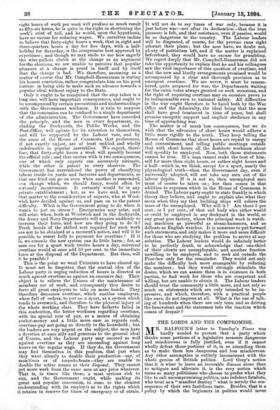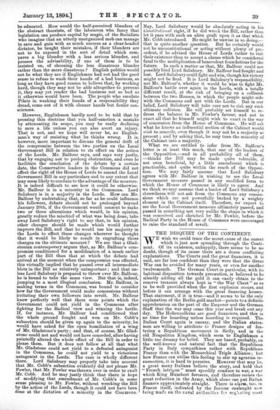THE LORDS AND THE COMPROMISE.
MR. BALFOUR'S letter to Tuesday's Times was hardly needed to protest that a party which thinks some portions of a legislative measure dangerous and mischievous is fully justified, even if it cannot wholly defeat those portions of it, in so amending them as to make them less dangerous and less mischievous. Any other assumption is entirely inconsistent with the whole genius of British politics. Lord Grey's notion that it is wiser to leave an incurable disease alone than to mitigate and alleviate it, is the very notion which turns so many politicians who choose to prefer what they like to .call uncompromising politics, into indolent fatalists, who treat as a "manifest destiny" what is merely the con- sequence of their own fastidious taste. Besides, that is a policy by which the beginners in politics would never be educated. How would the half-perceived blunders of the abstract theorists, of the labourers who fancy that legislation can produce capital by magic, of the Socialists who imagine that an utterly unorganised mob can manage to save and. gain with as much success as a clear-headed dictator, be taught their mistakes, if their blunders are not to be exposed in the sort of detail which com- pares a big blunder with a less serious blunder, and presses the advisability, if one of them is to be insisted on, of choosing the less disastrous blunder rather than the more disastrous ?. English politics would not be what they are if Englishmen had not had the good sense to refuse to wash their hands of a bad business, so long as they have good reason to believe that, by working hard, though they may not be able altogether to prevent it, they may yet render the bad business not so bad as it otherwise would have been. The people who emulate Pilate in washing their hands of a responsibility they dread, come out of it with cleaner hands but fouler con- sciences.
However, Englishmen hardly need to be told that by pressing this doctrine that you half-sanction a mistake by attenuating its scope, you may be really declining to save a life unless you can also avert an injury. That is not, and we hope will never be, an English- man's way of resisting what he thinks wrong. It is, however, more important to discuss the general drift of the compromise between the two parties on the Local Government Bill in relation to its effect on the action of the Lords. Mr. Balfour says, and says very justly, that by engaging not to prolong obstruction, and even to facilitate the conclusion of the debate by a certain date, the Conservative leaders in the Commons did not affect the right of the House of Lords to amend the Local Government Bill in any particulars and to any extent that may seem likely to conduce to the advantage of the measure. It is indeed difficult to see how it could be otherwise. Mr. Balfour is in a minority in the Commons. Lord Salisbury is in a majority in the Lords. How can Mr. Balfour by undertaking that, so far as he could. influence his followers, debate should not be prolonged beyond January 20th, if the Government would consent to make two or three alterations which would, in his opinion, greatly reduce the mischief of what was being done, take away Lord Salisbury's right to say that, in his opinion, other changes should be made which would further improve the Bill, and that he would use his majority in the Lords to effect these changes wherever he thought that it would be likely to result in engrafting those changes on the ultimate measure ? We see that a Glad- stonian contemporary argues that, as Mr. Balfour's com- promise conditioned for a modification of a much earlier part of the Bill than that at which the debate had arrived at the moment when the compromise was effected, this virtually implied that he passed over all intermediate blots in the Bill as relatively unimportant ; and that un- less Lord Salisbury is prepared to throw over Mr. Balfour, he is bound to take the same view. But that is, indeed, jumping to a most illogical conclusion. Mr. Balfour, in making terms in the Commons, was bound to consider how far the Government could make concessions without irritating their own followers into revolt. Mr. Balfour knew perfectly well that there were points which the Government could not yield in the Commons after fighting for the Radical view and winning the battle. If, for instance, Mr. Balfour had conditioned that the whole ground fought and won on Mr. Cobb's subsection should be given up again to the minority, he would have asked for the open humiliation of a wing of Mr. Gladstone's party ; and that, of course, Mr. Glad- stone could not and would not have conceded, after having pointedly altered the hole effect of the Bill in order to please them. But it does not follow at all that what Mr. Gladstone could not yield to a defeated antagonist in the Commons, he could not yield to a victorious antagonist in the Lords. The case is wholly different there. Lord Salisbury may properly take into account that Mr. Cobb's subsection evidently did not please Mr. Fowler, that Mr. Fowler was thrown over in order to exalt Mr. Cobb. And he may justly think that there is hope of modifying that amendment of Mr. Cobb's in some sense pleasing to Mr. Fowler, without wrecking the Bill by the action of the Lords, though it could. not have been done at the dictation of a minority in the Commons. Nay, Lord Salisbury would be absolutely acting in his Constitutional right, if he did wreck the Bill, rather than let it pass with such an alien graft upon it as that which Mr. Cobb introduced. He might be unwise in so doing,— that is quite another question. But he certainly would not be unconstitutional or acting without plenty of pre- cedent, if he advised the House of Lords rather to risk their existence than to accept a clause which he considered fatal to the multiplication of benevolent foundations for the future. In such a matter as that, Mr. Balfour could not possibly bind Lord Salisbury. Mr. Balfour had fought and lost. Lord Salisbury could fight and win, though his victory might not be final. It is Lord Salisbury's responsibility, not Mr. Balfour's, whether it would be wise to fight Mr. Balfour's battle over again in the Lords, with a totally different result, at the risk of bringing on a collision between the two Houses, in which the people might side with the Commons and not with the Lords. But in our belief, Lord Salisbury will take care not to risk any such ultimate collision. He will probably set himself to re- dress the balance in Mr. Fowler's favour, and not to exact all that he himself might wish to exact in the way of concession from the House of Commons. He will ask what he knows an influential section of the Cabinet would wish to concede, even though it may not be a majority at present ; and by asking that, he may turn the minority of the Cabinet into a majority.
What we are entitled to infer from Mr. Balfour's letter is at least this much, that one of the leaders of the Opposition,—and in all probability all of them. —thinks the Bill may be made quite tolerable, if not even beneficial, by a little amendment which is practicable, and quite within the reach of the Opposi- tion. We may fairly assume that Lord Salisbury agrees with Mr. Balfour in wishing to see the Local Government measure passed in any modified form to which the House of Commons is likely to agree. And we think we may assume that a leader of Lord Salisbury's shrewdness will not ask from the Commons any conces- sions which are not powerfully backed by a weighty element in the Cabinet itself. Therefore, we expect to see the Local Government measure ultimately passed, and passed in something not very unlike the shape in which it was conceived and sketched by Mr. Fowler, before the Radical Party in the House of Commons were encouraged to raise the standard of revolt.







































 Previous page
Previous page